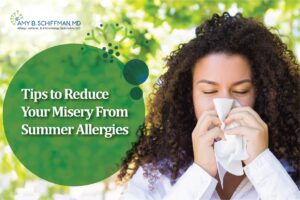Overview
The summer allergy season is in full force. Pollen allergy may occur all year, however, triggers and symptoms may vary by season. Here are some explanations of summer allergies and tips on how to reduce their symptoms.
What are Summer Allergies?
Summer allergies refer to allergic symptoms you may experience during the summer. According to the Asthma and Allergy Foundation of America (AAFA), allergies are the 6th leading cause of chronic illness in the US. They also state that more than 50 million Americans experience various types of allergies in a year. Summer allergies may encompass both spring tree pollen allergy, typical grass pollen allergy, and include fall weed allergy.
Causes of Summer Allergies
Knowing what triggers your allergies is crucial so that you attempt to avoid them. Here are allergens and irritants that may trigger your summer allergies.
-
Pollen
While trees and flowering plants are typically spring allergens, an extended pollen season can spill over into summer, especially in warmer climates. Summer is known as the grass pollen season, and by late summer, weed pollen adds to the amount of pollen, which may increase the severity of symptoms. The weather plays a large part in the pollen count as well. Pollen levels increase on warm, windy days. A long, wet season, increases the density of the plants and therefore raises the amount of pollen. There are both Northern and Southern grasses, that grow in both parts of the country. The most common weeds and grasses that trigger allergies are:
Grasses
- Timothy
- Kentucky Blue
- Johnson
- Rye
- Fescue
- Bermuda
- Bahia
- Sweet Vernal
- Red Top
- Orchard
- Blue Grasses.
Weeds
- Ragweed
- Cockleweed
- Pigweed
- Russian thistle
- Sagebrush
- Tumbleweed
-
Smog
Smog refers to a type of intense air pollution, which occurs when chemical particulates react to sunlight or moisture, and gases mix. The most common is ozone, which arises from the reaction of nitrogen oxides with hydrocarbon vapors from automobiles, in the presence of sunlight. Summer air pollution is not an allergen but rather an irritant. It aggravates asthma and allergy symptoms. Increases in allergic rhinitis have occurred in the presence of rapid urbanization and an increase in energy consumption worldwide.
-
Mold Spores
Mold spores are another common allergen. Molds are typically found in damp places like basements, bathrooms, rotting logs, and fallen leaves. However, some molds are more prevalent during dry, windy days. Molds release spores in the air that are inhaled and trigger allergy symptoms.
Symptoms of Summer Allergies
Symptoms of summer allergies range from mild to severe and are similar to allergy symptoms during other times of the year. However, people with allergic asthma should be cautious, as summer allergens may trigger an asthma attack. Common symptoms of summer allergies are:
- Nasal Congestion
- Sneezing
- Runny Nose
- Stuffy Nose
- Itchy Eyes
- Ear Congestion
- Allergic Asthma
- Itchy sinuses, throat, or ear canals
- Postnasal drip
There are also less common symptoms like:
- Coughing
- Wheezing
- Shortness of Breath
- Headache
How are Summer Allergies Diagnosed?
Your physician will ask about your symptoms, its frequency, and your allergy history. They will also refer you to an allergist, a specialist in diagnosing and treating allergies, for more specific tests like skin tests, and blood tests.
Tips to Reduce Summer Allergies
Don’t let your allergies stop you from enjoying the summer. Here are some simple ways that can make the summer allergy season easier:
- Keep track of the pollen count and smog levels of your area and try to avoid being outdoors when levels are high
- Use a HEPA air purifier
- Clean your air filters and vents where pollen collects
- Use your air conditioner and keep your doors and windows shut
- Frequently change and wash your beddings, pillows, and rugs
- Dust your bookshelves, and cabinets
- Vacuum your house regularly with a HEPA filter.
- Mow your lawn to avoid grass pollens and wear a mask while doing so.
- Keep the level of humidity in your home between 30-50% to minimize dust mites
How to Treat Summer Allergies?
Medications:
- Prescription Medications
- Over the Counter Medications
Immunotherapy:
- Allergy shots
- Allergy tablets
Where to Get Treated for Summer Allergies?
If you have summer allergy symptoms, talk to your allergist for proper diagnosis, and to help formulate a treatment plan that is right for you. Dr. Amy Schiffman is an allergy and immunology specialist in Boca Raton, Florida. She is more than happy to help you manage your allergies so you can enjoy your summer.

